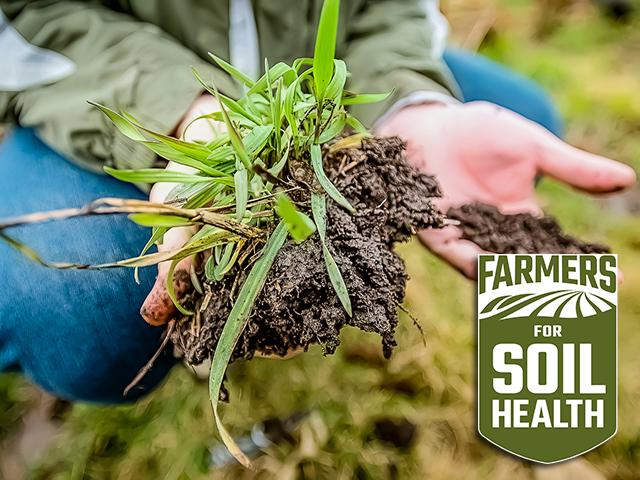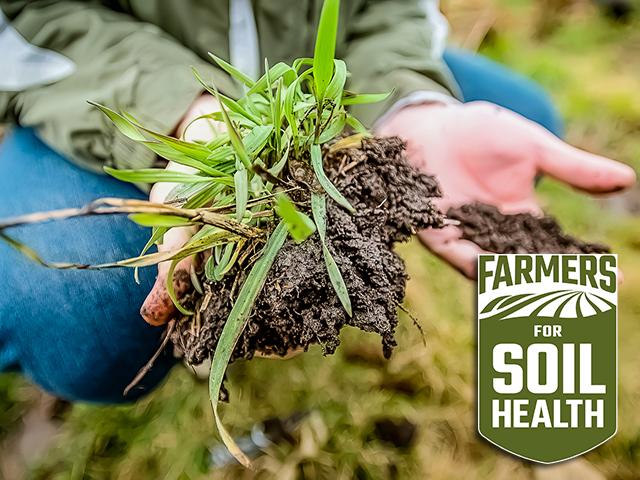Ag Policy Blog
New Initiative Connects Farmers, Soil Health and a Sustainable Marketplace Opportunity
OMAHA (DTN) -- Farmers who want to grow cover crops could also capture better market opportunities for their crops if they consider joining the new initiative Farmers for Soil Health.
The group, which received a climate-smart funding grant from USDA, is now signing up farmers in 20 states and offering a $50-an-acre incentive spread over three years for producers.
DTN is a collaborator on the Farmers for Soil Health project led by the United Soybean Board, the National Corn Growers Association and the National Pork Board. Enrollment for the program has begun, and the partnership recently held a webinar to highlight some of its benefits.
Ben West, executive director of Farmers for Soil Health, emphasized a distinction between Farmers for Soil Health and other programs is that the initiative was "developed by farmers for farmers."
"I have told a lot of people in the last few months that if you're not excited about what's happening right now in conservation and agriculture and you're not in this space, you should be," West said. "We think Farmers for Soil Health is one of the big things happening across the country."
West also noted the collaboration among the major commodity groups involved in the initiative actually began before USDA started crafting its climate-smart programs.
Partnering with the National Fish and Wildlife Foundation and collaborators like DTN, Farmers for Soil Health received a $95 million grant as part of USDA's Partnership for Climate-Smart Commodities -- one of the two largest grants awarded under the program.
"Our goal is to double the amount of cover crops in the U.S.," West said. It would move cover crops from about 15.7 million acres to more than 30 million acres by 2030.
Farmers for Soil Health will operate in 20 states to enroll farmers, paying $50 an acre over a three-year period to help establish cover cropping practices.
One aspect of Farmers for Soil Health that came from conversations with farmers was the need for more education about cover crops, West said.
"A lot of farmers who are not currently using cover crops aren't (doing so) simply because they don't understand them," West said. "They don't understand exactly how to incorporate them into their operations. Maybe they don't understand the potential market and financial incentives that could be coming their way. And we know any time a farmer incorporates a significant new practice, they need help."
That's where Farmers for Soil Health will be drawing from more on-the-ground technical assistance from the commodity organizations in the states where it will operate. In at least a few states, groups such as the Iowa Soybean Association already have conservation agronomists on staff to work with producers on some of these topics. Farmers for Soil Health also will be making more videos, podcasts and webinars to get the message out to producers.
Other programs might pay more per acre for cover crops, but West emphasized another goal for the program is to keep the enrollment process simple. He said a producer can enroll fields in Farmers for Soil Health in about 10 minutes.
P[L1] D[0x0] M[300x250] OOP[F] ADUNIT[] T[]
SUSTAINABILITY MARKETPLACE
The centerpiece of the USDA's Partnership for Climate-Smart Commodities is to develop markets where producers can promote and sell commodities produced with climate-smart practices.
Partnering with Farmers for Soil Health, DTN has developed a "Sustainability Marketplace" platform where farmers growing commodities using practices such as cover crops, conservation tillage, buffer strips or other practices can list their commodities on an open platform. Commodity buyers ranging from packaged-food companies to feed companies and biofuel plants could then buy those commodities.
"We think this is the most exciting piece long term," West said. "Our objective here is really to flatten the supply chain between the farmer and the end user and ensure that there is lots of transparency."
Producers will know who is buying their commodities and the type of premiums involved. "We think that's a real game-changer," West said.
Grey Montgomery, vice president of strategy and corporate development at DTN, also dove a little deeper into the Sustainability Marketplace and its potential. He noted that farmers face the challenge of having few buyers around them which translates into farmers being "price takers." There are almost no ways for them to differentiate their commodities.
Some companies, over time, have taken traditional commodities and developed premium brands. Montgomery pointed to how Starbucks elevated the market for a cup of coffee.
Buyers, on the other hand, also lack both traceability and the ability to account for their supply chain emissions -- carbon counting on a scale. "Consumers want to be able to buy products that show where they can see -- in a perfect world -- some degree of traceability and in many cases a degree of net-zero carbon," Montgomery said.
Farmers enrolled in Farmers for Soil Health can build a business model to help receive a premium rate for their farming practices. They can integrate data already collected through their software programs with machinery or seed-company programs, such as Climate FieldView, and then get notifications on certain prices or premiums being offered.
"So, this is basically your own personal management tool," Montgomery said.
Depending on how much information farmers provide, food, feed, fiber and biofuel companies signing up with the Sustainability Marketplace can connect with farmers to buy their commodities. Montgomery noted the volume of companies looking for such commodities will continue to grow as they commit to net-zero pledges or face an environmental, social or governance (ESG) requirement.
"They may have an ESG reporting incentives. They want to be able to say to their shareholders that they have become a net-zero company or they may have regulatory reporting requirements," Montgomery said.
Montgomery added there are a lot of conversations going on now about what a meaningful premium in the market will look like. The Sustainable Marketplace will provide a way for farmers to start operating in that space.
FARMER PERSPECTIVES
Brandon Hunnicutt, a Nebraska farmer and National Corn Growers Association board member, grows popcorn among his other crops. Since popcorn and white corn are consumer products, he said there is increasing interest among buyers about how those crops are raised.
"A little bit of my hope and fear is that they'll say 'we're only going to buy if it is based on these sustainability practices or this sustainability score,' which, if we know what we're doing and we understand how to market that, it gives us a leg up on the competition maybe in other parts of the world," Hunnicutt said.
Shannon Ellis, a member of the United Soybean Board, said it's important that producers receive financial incentives for enrolling in the program and expanding cover-crop acreage. Ellis said she and her family are also interested in the Sustainability Marketplace.
"From a U.S. soy perspective, we see demand, both globally and domestically, where consumers and end users are looking for those sustainably raised products, and they want verification of that from farm-to-fork or the end user," Ellis said. "I think that connection between the farm and the marketplace -- offering a premium for that sustainably raised production -- hopefully is going to be rewarding for us."
ADDITIONALITY CHALLENGE
As DTN reported, one of the unresolved issues with pilot projects created by the Partnership for Climate-Smart Commodities is the risk farmers could enroll in a climate-smart project but lose out on carbon credit in the future. Bruce Knight, a former USDA undersecretary for marketing and regulatory programs, recommends farmers enroll in a climate-smart project and a carbon program at the same time.
Essentially, private carbon-credit markets might not give farmers credit for planting cover crops for the carbon market in hindsight. Enrolling in a climate-smart program at the same time negates that issue, Knight said. The issue is known as creating "additionality" when farmers lower their carbon footprint for carbon-market credit.
Voluntary carbon markets, though, remain a small market with standards that vary. When talking to DTN, West said the issue of additionality remains unsettled.
"In my mind, it's not a closed question about how we deal with that," he said. "There are still a lot of unknowns about where the carbon markets are going."
Also see "As Climate-Smart Projects Seek to Enroll Farmers, Additionality Question Still Unanswered" here: https://www.dtnpf.com/….
To watch the full webinar on Farmers for Soil Health, go to https://www.dtnpf.com/….
Chris Clayton can be reached at Chris.Clayton@dtn.com.
Follow him on X, formerly known as Twitter, @ChrisClaytonDTN.
(c) Copyright 2023 DTN, LLC. All rights reserved.






Comments
To comment, please Log In or Join our Community .